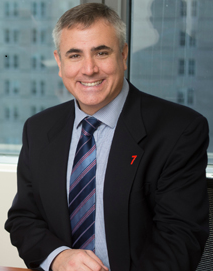Donald M. Lloyd-Jones, MD, ScM, FACC, FAHA

- Senior Associate Dean for Clinical and Translational Research
- Chair, Department of Preventive Medicine
- Director, Northwestern University Clinical and Translational Sciences Institute (NUCATS)
- Eileen M. Foell Professor
- Professor of Preventive Medicine (Epidemiology) and Medicine (Cardiology)
Dr. Lloyd-Jones earned his BA from Swarthmore College in 1986, his MD degree from Columbia University College of Physicians and Surgeons in 1991, and a Master of Science degree in Epidemiology from the Harvard School of Public Health in 2001. He was a resident in Internal Medicine at Massachusetts General Hospital in Boston, and served as Chief Medical Resident in 1995-1996. After his cardiology fellowship at MGH, he joined the staff as an attending cardiologist, and was an Instructor and then Assistant Professor of Medicine at Harvard Medical School. He joined the National Heart, Lung, and Blood Institute’s Framingham Heart Study as a research fellow in 1997, and became a staff research associate in 1999.
He moved to Northwestern University in 2004, and was appointed the Chair of the Department of Preventive Medicine in 2009. He is the Eileen M. Foell Professor of Heart Research, Professor of Preventive Medicine and Medicine-Cardiology, and also Senior Associate Dean for Clinical and Translational Research, and Director of the Northwestern University Clinical and Translational Sciences (NUCATS) Institute.
Dr. Lloyd-Jones’ research interests include the study of the mechanisms and life course of healthy aging and cardiovascular disease epidemiology, risk estimation, and prevention. A main focus of his research has been investigation of the life course of chronic diseases of aging, lifetime risks for various cardiovascular diseases, and factors which modify those risks. Other areas of interest include CVD risk estimation using novel biomarkers, imaging of subclinical atherosclerosis, and the epidemiology of hypertension. His clinical and teaching interests lie in general cardiology, with a focus on prevention. He chaired the committee and authored the monograph that defined and set the American Heart Association’s Strategic Impact Goals for 2020 and Beyond, including a bold new focus on cardiovascular health promotion. He was co-chair of the Risk Assessment Guidelines and a member of the Cholesterol Treatment Guidelines Panel for the 2013 ACC/AHA Guidelines for Cardiovascular Disease Risk Reduction. Continuing in that vein, he is currently a member of the 2018 AHA/ACC Cholesterol Guidelines Panel and chaired the 2016 and 2017 ACC Expert Consensus documents on use of non-statins for CVD risk reduction. . He has authored over 350 scientific publications to date. In 2014, 2015, and 2016 he was named by Thomson Reuters as a “Highly Cited Researcher,” a distinction reserved for investigators in the top 1% by total citations of highly cited papers in their scientific field (in this case, clinical medicine) during the period 2002-2014.
He is a Fellow of the American College of Cardiology and the American Heart Association (AHA), and is an inducted member of the American Society for Clinical Investigation and Association of American Physicians. In 2010, he was awarded the AHA’s annual Chairman’s Award, recognizing the volunteer who has performed outstanding service to further the AHA’s strategic goals. He is also a recipient of the 2017 Physician of the Year Award from the AHA, and the Joseph Stokes, III, MD Award from the American Society for Preventive Medicine. He is a recipient of numerous teaching awards, including the Patterson Award for Teacher of the Year from the Department of Medicine and the Teacher of the Year from the Division of Cardiology at Northwestern. In 2013, he was awarded Northwestern’s Tripartite Legacy Award in recognition of his achievements as a mentor, leader, and translational physician-scientist.
